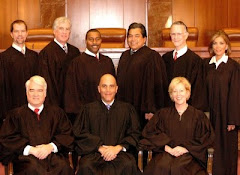Sunday, September 27, 2009
Discovery Mandamus Granted to Protect Trade Secrets: In Re Union Pacific Railroad Company (Tex. 2009)
AND THE FIRST WINNER IN THE NEW FISCAL YEAR IS -----------
----- A TORT DEFENDANT !
Texas Supreme Court Grants Mandamus Petition to Protect Railroad from Discovery Requests
In its first case decided with opinion in the new fiscal year, the Texas Supreme Court granted mandamus relief last Friday to protect a corporate defendant from discovery requests propounded by a tort plaintiff in a suit stemming from a train collision and escape of toxic fumes.
No surprises here.
The Supreme Court (currently consisting of eight members pending appointment of a replacement for former Justice Scott Brister) granted mandamus relief to validate the defendant's motion to quash even though the plaintiff's attorney had agreed to protect the company's trade secrets through an appropriate order of protection from disclosure to third parties. The San Antonio Court of Appeals had denied the railroad's petition for mandamus relief.
In Re Union Pacific Railroad Co. No. 08-0740 (Tex. Sep. 25, 2009) (per curiam) (discovery mandamus granted to protect trade secrets, privilege, pricing information)
IN RE UNION PACIFIC RAILROAD COMPANY; from Bexar County;
4th district (04-08-00388-CV, ___ SW3d ___, 08-20-08)
Pursuant to Texas Rule of Appellate Procedure 52.8(c), without hearing oral argument, the Texas Supreme Court conditionally grants the petition for writ of mandamus.
EXCERPT FROM THE PER CURIAM OPINION:
The potential harm to Union Pacific due to possible disclosure is also problematic. Constanzo first points to the protective order. The trial court did enter an order restricting those who could view the rate structures, but that alone does not ensure that an order will not violate the trade secret privilege. See id. at 731–32 (granting mandamus relief where trial court ordered relator to disclose trade secrets only to three attorneys and an expert witness and only on paper that could not be photocopied).
Constanzo claims the order is narrow, but we disagree.
The order requires Union Pacific to release rate structures related to all hazardous materials shipped for OxiChem from June 2003 through June 2005. It also requires the release of all OxiChem rate structures for chlorine chemicals for the same time period. Worrell explained the potential harm associated with this disclosure: “Disclosure of the information would irreparably harm Union Pacific because it would provide competitors with an advantage in predicting Union Pacific pricing and undercutting Union Pacific efforts to market and conduct its business with its customers in a competitive fashion.”
Constanzo failed to meet her burden of establishing that the rate structures are “material and necessary” to the case. Bass, 113 S.W.3d at 743. “[N]o adequate appellate remedy exists if a trial court orders a party to produce privileged trade secrets absent a showing of necessity.” Id. at 745. Accordingly, without hearing oral argument, Tex. R. App. P. 52.8(c), we conditionally grant Union Pacific’s petition for writ of mandamus and direct the trial court to vacate its May 9, 2008 order compelling production of rate structures and issue further orders consistent with this opinion. We are confident the trial court will comply. The writ will issue only if it fails to do so.
* * *
FN2: When Union Pacific filed its petition for writ of mandamus, underlying proceedings were pending in the 73rd Judicial District Court and the 288th Judicial District Court in Bexar County. Honorable Karen H. Pozza, presiding judge of the 407th Judicial District Court in Bexar County, signed the pretrial order at issue in this mandamus proceeding. When courts use central docketing, as in Bexar County, we generally treat the judge who signed the order as the respondent. In re Schmitz, 285 S.W.3d 451, 454 (Tex. 2009).
Labels:
discovery,
mandamus,
protective orders
Subscribe to:
Posts (Atom)


